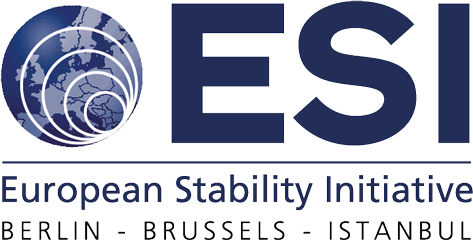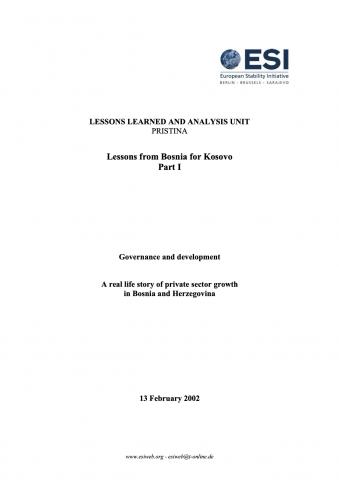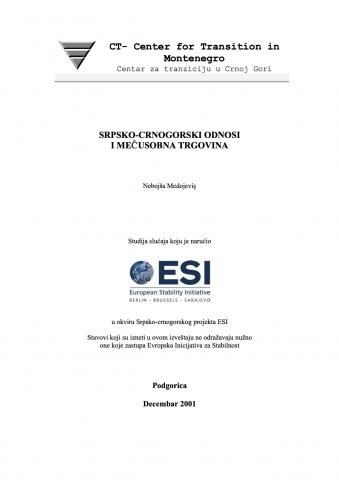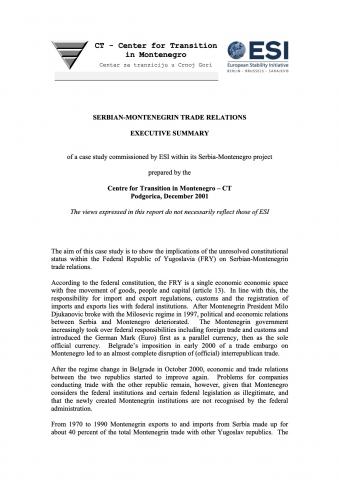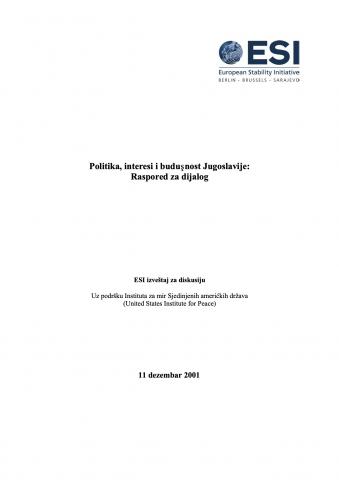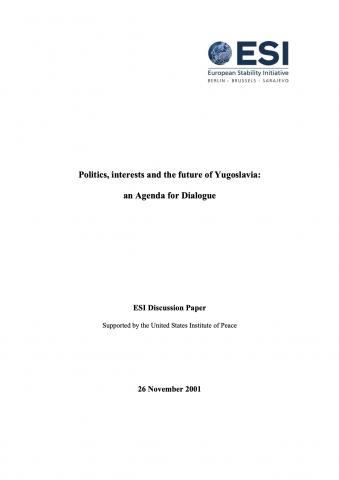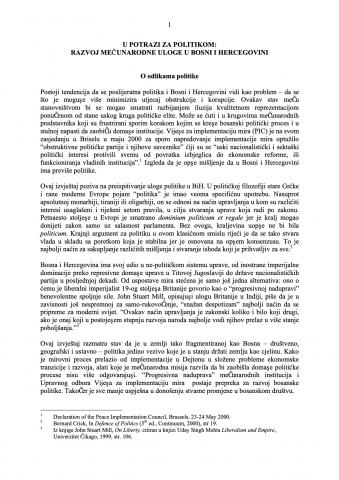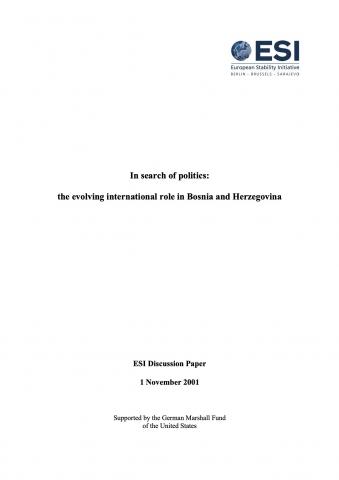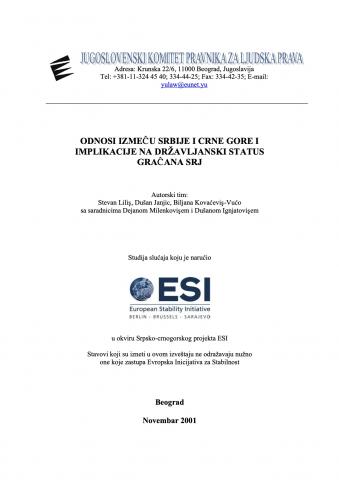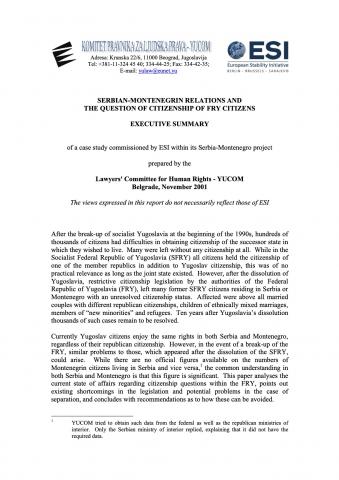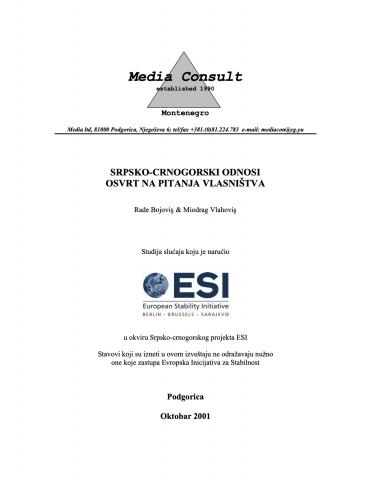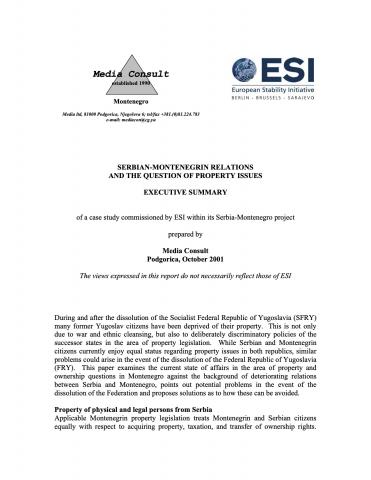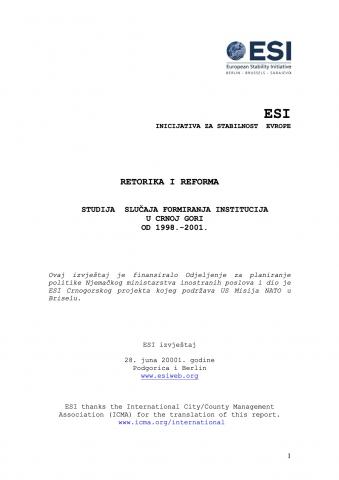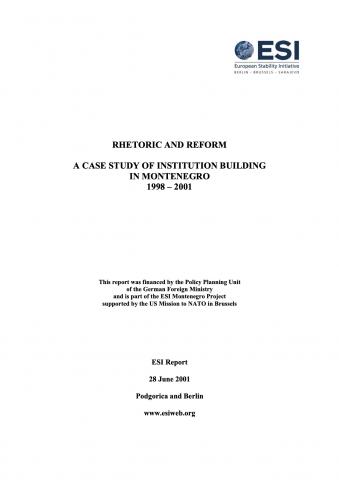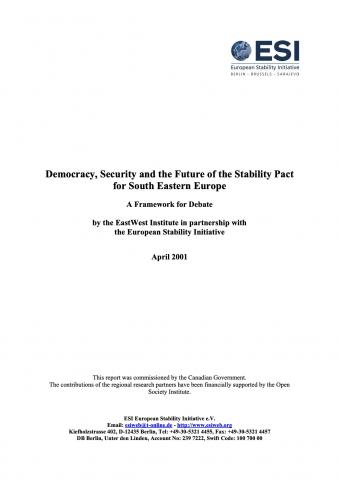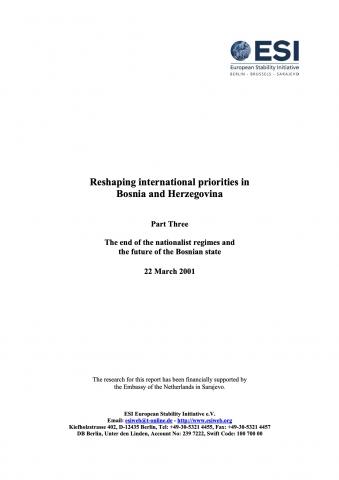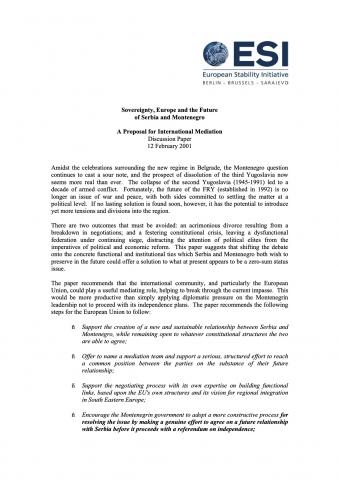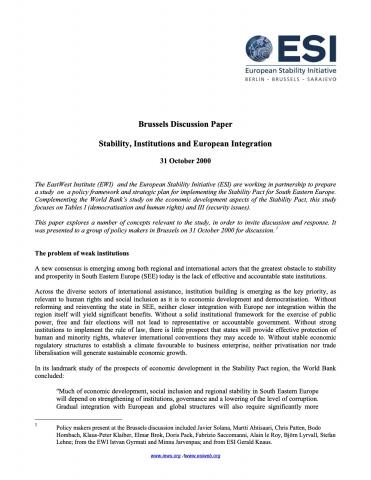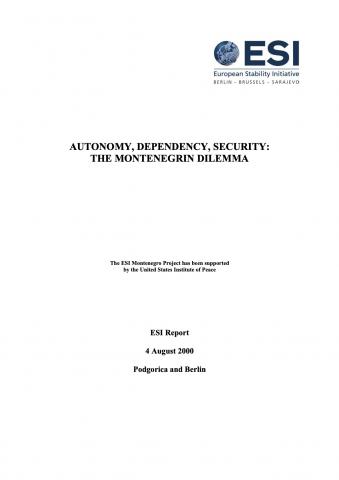Publications
230 PublicationsGovernance And Development - A Real Life Story Of Private Sector Growth In Bosnia And Herzegovina
For some time, international agencies in Bosnia and Herzegovina have spoken of the need for a change of paradigm: from reconstruction to development. What distinguishes effective development strategies from pure reconstruction is that they focus on developing local institutions and capacities. This requires knowledge of the institutional and political realities prevailing in the field, especially at local level.
Upravljanje i razvoj. Stvarna priča o rastu privatnog sektora u Bosni i Hercegovini
Jedno vrijeme su međunarodne agencije u Bosni i Hercegovini govorile o potrebi za promjenom paradigme: sa rekonstrukcije na razvoj. Ono po čemu se strategije efikasnog razvoja razlikuju od čiste rekonstrukcije je
Governance And Development. A Real Life Story Of Private Sector Growth In Bosnia And Herzegovina
For some time, international agencies in Bosnia and Herzegovina have spoken of the need for a change of paradigm: from reconstruction to development. What distinguishes effective development strategies from pure reconstruction is that they focus on developing local institutions and capacities. This requires knowledge of the institutional and political realities prevailing in the field, especially at local level.
Srpsko-Crnogorski Odnosi I Meðusobna Trgovina
Savezna Republika Jugoslavija je nastala kao rezultat politickog dogovora dvije komunisticke elite i od samog pocetka bila je opterecena deficitom legaliteta i legitimiteta. Tako su i bilateralani odnosi izmedu Srbije i Crne Gore unutar SRJ dominatno zavisili od politickih odnosa vladajucih garnitura, a nerijetko i od licnih odnosa vodecih ljudi Beograda i Podgorice. SRJ nikad nije zaživjela kao ozbiljna pravna država, a savezne institucije nijesu uspjele da nametnu svoj autoritet i nikada nijesu funkcionisale na osnovu Saveznog ustava i zakona. Odnosi u federaciji su vrlo cesto bili optereceni sukobima ili krizama manjeg ili veceg intenziteta, koji su se uglavnom rešavali medusobnim dogovorima politickih lidera, uglavnom van institucija sistema.
Serbian-Montenegrin Trade Relations
According to the federal constitution, the FRY is a single economic economic space with free movement of goods, people and capital (article 13). In line with this, the responsibility for import and export regulations, customs and the registration of imports and exports lies with federal institutions. After Montenegrin President Milo Djukanovic broke with the Milosevic regime in 1997, political and economic relations between Serbia and Montenegro deteriorated.
Politika, Interesi I Budućnost Jugoslavije: Raspored Za Dijalog - ESI Izve
Ovaj izveštaj ispituje sadašnju ustavnu raspravu o buducnosti Savezne Republike Jugoslavije, i nalazi da je frustrirajuce siromašna po svom sadržaju. Uzima u obzir motive vodecih politickih igraca i istražuje interese raznih grupa gradana. Nalazi da postoji prava prilika za ambiciozne napredne politicare i u Srbiji i u Crnoj Gori koji su spremni da tretiraju konkretne probleme onih gradana na koje ustavna rasprava neposredno utice, cak pre referenduma u Crnoj Gori.
Politics, interests and the future of Yugoslavia - An agenda for dialogue
This paper examines the current constitutional debate on the future of the Federal Republic of Yugoslavia, and finds it to be frustratingly short on content. It considers the motivations of the major political players and explores the interests of various groups of citizens. It finds that there may be a real opportunity for ambitious forward-looking politicians in both Serbia and Montenegro who are willing to address the concrete concerns of those citizens most directly affected by the constitutional debate, even prior to a referendum in Montenegro.
U Potrazi Za Politikom: Razvoj Meðunarodne Uloge U Bosni I Hercegovini
Postoji tendencija da se poslijeratna politika i Bosni i Hercegovini vidi kao problem – da se što je moguće više minimizira utjecaj obstrukcije i korupcije. Ovakav stav među stanovništvom bi se mogao smatrati razbijanjem iluzija kvalitetnom reprezentacijom ponuđenom od stane uskog kruga političke elite. Može se čuti i u krugovima međunarodnih predstavnika koji su frustrirani sporim korakom kojim se kreće bosanski politički proces i u stalnoj napasti da zaobiđu domaće institucije. Vijeće za implementaciju mira (PIC) je na svom zasjedanju u Briselu u maju 2000 za sporo napredovanje implementacije mira optužilo "obstruktivne političke partije i njihove saveznike" čiji su se "uski nacionalistički i sektaški politički interesi protivili svemu od povratka izbjeglica do ekonomske reforme, ili funkcioniranja vladinih institucija".Izgleda da je opće mišljenje da u Bosni i Hercegovini ima previše politike.
In Search Of Politics: The Evolving International Role In Bosnia And Herzegovina
There is a tendency to see politics in post-war Bosnia and Herzegovina as a problem – an obstructive and corrupting influence to be minimised as far as possible. One can find this attitude among citizens disillusioned with the quality of representation offered by the narrow circle of political elites. One hears it among international officials frustrated with the slow pace of Bosnia's political process, and constantly tempted to bypass domestic institutions.
Odnosi Između Srbije I Crne Gore I Implikacije Na Državljanski Status Gradana Srj
Pitanje državljanskog statusa građana, na teritoriji bivše SFRJ bilo je jedno od dominantnih pitanja u poslednjih deset godina, a mnogi građani bili su suočeni s ozbiljnim preprekama u ostvarivanju njihovih prava koja su vezana sa nerešenim državljanskim statusom. U slučaju osamostaljenja Crne Gore realno je očekivati da bi se broj i kvalitet problema vezanih za državljanski status dodatno iskomplikovao. U vezi s osamostaljenjem Crne Gore je i pitanje redefinisanja statusa Kosova, odnosno redifinisanja odnosa unutar SRJ, postavlja se kao realan problem i pitanje državljanskog statusa stanovnika Kosova.
Serbian-Montenegrin Relations And The Question Of Citizenship Of FRY Citizens
After the break-up of socialist Yugoslavia at the beginning of the 1990s, hundreds of thousands of citizens had difficulties in obtaining citizenship of the successor state in which they wished to live. Many were left without any citizenship at all. While in the Socialist Federal Republic of Yugoslavia (SFRY) all citizens held the citizenship of one of the member republics in addition to Yugoslav citizenship, this was of no practical relevance as long as the joint state existed.
Srpsko-Crnogorski Odnosi Osvrt Na Pitanja Vlasništva
Pravo svojine kao apsolutno stvarno pravo (erga omnes) i u crnogorskom građansko-pravnom poretku podrazumijeva tri klasična ovlaéćenja svakog vlasnika: a) pravo drëanja; b) pravo koriéćenja i c) pravo raspolaganja. Istovremeno, pravo svojine u Crnoj Gori se stiče na način koji je tipičan za istorijska područja na kojima je izvréena recepcija rimskog prava, éto preteëno obuhvata sticanje svojine putem pravnog posla, nasljeđivanjem ili zakonom. Sva fizička i pravna lica u Crnoj Gori mogu imati pravo svojine na pokretnim i nepokretnim stvarima. To podrazumijeva pravo svojine na: stambenim i poslovnim zgradama, stanovima, poslovnim prostorijama, poljoprivrednom zemljiétu, gradsko-građevinskom zemljiétu, éumama, éumskom zemljiétu itd.
Serbian-Montenegrin Relations And The Question Of Property Issues
During and after the dissolution of the Socialist Federal Republic of Yugoslavia (SFRY) many former Yugoslav citizens have been deprived of their property. This is not only due to war and ethnic cleansing, but also to deliberately discriminatory policies of the successor states in the area of property legislation. While Serbian and Montenegrin citizens currently enjoy equal status regarding property issues in both republics, similar problems could arise in the event of the dissolution of the Federal Republic of Yugoslavia (FRY). This paper examines the current state of affairs in the area of property and ownership questions in Montenegro against the background of deteriorating relations between Serbia and Montenegro, points out potential problems in the event of the dissolution of the Federation and proposes solutions as to how these can be avoided.
Retorika I Reforma - Studija Slučaja Formiranja Institucija U Crnoj Gori Od 1998-2001
Postoji realan rizik da Crna Gora dalje socijalno propada. To ce rezultirati pritiscima na crnogorsko društvo koji ce biti znacajni, a bit ce ih teško predvidjeti. Donatori sa Zapada, koji su iz strateških razloga dopustili da Crna Gora postane zavisna od izdašne spoljne pomoci, sada imaju interes i odgovornost da, uzevši u obzir angažovanost crnogorskih vlasti, pomažu bivšim saveznicima da se prilagode na nove uslove tokom odredenog perioda.
Rhetoric and Reform - A case study of institution building in Montenegro 1998
With the demise of former Yugoslav President Slobodan Milosevic and the change of administration in Belgrade in autumn 2000, an extraordinary period in Montenegrin history came to an end. Since then, as the Federal Republic of Yugoslavia has re-entered international institutions, the political landscape has been transformed. As political changes in Belgrade reduce Montenegro's strategic importance to the West, donor priorities are changing and Montenegro can no longer count on external subsidies continuing at the extraordinary level of the past years. At the same time, the issue of the legacy of Yugoslavia
Democracy, Security And The Future Of The Stability Pact For South Eastern Europe
The Stability Pact reflected an extraordinary consensus among the wider international community and the states of the region that something had to be done to address the problems of instability in South Eastern Europe at their source, breaking once and for all the cycle of conflict. Following a decade of reactive crisis management, the Pact was to be a "turning point" after "too many false dawns, too many shattered hopes and lives, too many tensions left unresolved".
Reshaping International Priorities In Bosnia And Herzegovina - Part III The End Of The Nationalist Regimes And The Future Of The Bosnian State
Over the last two years, Bosnia has changed dramatically. The ethnic power structures left over from the war have begun to crumble. Political changes in Croatia and Serbia have cut external revenues, forcing the political elites in Bosnia to reorient themselves towards the international community and participate in the Bosnian state. With the right focus of international efforts, the core Dayton agenda can be completed within the next 2-3 years.
Sovereignty, Europe and the future of Serbia and Montenegro - A proposal for international mediation
Amidst the celebrations surrounding the new regime in Belgrade, the prospect of dissolution of the third Yugoslavia now seems more real than ever. Fortunately, the future of the FRY s no longer an issue of war and peace, with both sides committed to settling the matter at a political level. If no lasting solution is found soon, however, it has the potential to introduce yet more tensions and divisions into the region.
Stability, Institutions And European Integration - Brussels Discussion Paper
A new consensus is emerging that the greatest obstacle to stability and prosperity in South Eastern Europe today is the lack of effective and accountable state institutions. Without a solid institutional framework for the exercise of public power, free and fair elections will not lead to representative or accountable government. Without strong institutions to implement the rule of law, there is little prospect that states will provide effective protection of human and minority rights, whatever international conventions they may accede to.
Autonomy, dependency, security: The Montenegrin dilemma
Since the Montenegrin government distanced itself from the president of the Federal Republic of Yugoslavia, Slobodan Milosevic, during last year's Kosovo war, Montenegro has found itself in the international spotlight. Montenegrin politicians have been courted by the West. The United States and the European Union have offered rapid and substantial financial aid
